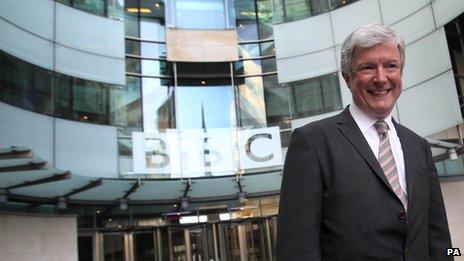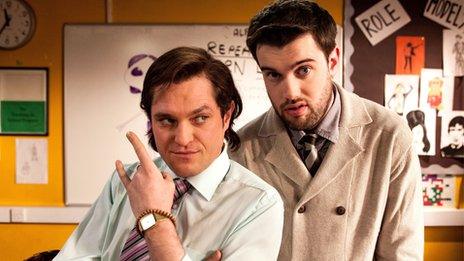BBC to argue for licence fee to be linked to inflation
- Published

Director general Tony Hall has recently been making his case for the licence fee
A report into how the BBC is funded has recommended arguing for the licence fee to be pegged to inflation from 2020, instead of the current freeze.
The BBC commissioned the "blue-skies" report to explore future funding options, featuring views from a panel of independent economists, media experts and academics.
It also recommended making better use of commercial revenues to boost funds.
The BBC denied claims it backed the introduction of a subscription service.
"The report recommends that the BBC pursue an inflationary licence fee increase with greater commercial revenue. No subscription model is recommended," the corporation said a statement.
It follows a report in The Sunday Times, external claiming the BBC was calling for the licence fee to be scrapped.
The current fee has been frozen at £145.50 since 2010.
It is up for renewal at the end of 2016, with some suggestion negotiations could start as early as this year. However the BBC's report looked at ideas for funding from 2020.
A draft version also recommended the BBC consider coming out of public ownership and becoming a mutual, owned by its users, if an inflation rise for the licence fee was ruled out by the government.

Bad Education's Matthew Horne and Jack Whitehall backed a Twitter campaign to save BBC Three last week after it was announced the channel will move to the iPlayer
Director general Tony Hall recently defended the licence fee, suggesting it should be extended to include people watching programmes via the iPlayer service.
"There is room for modernisation so that the fee applies to the consumption of BBC TV programmes, whether live on BBC One or on-demand via the iPlayer," Lord Hall told a media conference in Oxford last month.
Last week he confirmed BBC Three would be moved to the iPlayer in autumn 2015, with its budget slashed from £85m to £25m.
BBC One drama will receive a £30m boost from the closure, in a move that is "strategically right and financially right too", the director general said.
The BBC's director of television, Danny Cohen, said the future of BBC Four was not certain either.
"We can't keep offering the same with less money. If future funding for the BBC comes under threat, the likelihood is we would have to take more services along the same route," he said.
Meanwhile ministers are considering plans to make not paying the TV licence a civil offence, rather than a criminal one.
Culture Secretary Maria Miller said the proposal, backed by more than 100 MPs, should be part of talks surrounding the renewal of the BBC charter in 2016.
In 2012 180,000 people were prosecuted for not paying their licence, more than one in 10 of the criminal prosecutions that year.
- Published8 March 2014
- Published6 March 2014
- Published26 February 2014
- Published24 February 2014